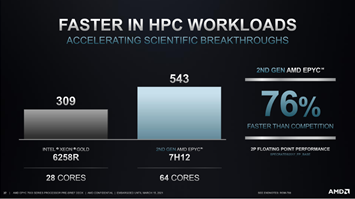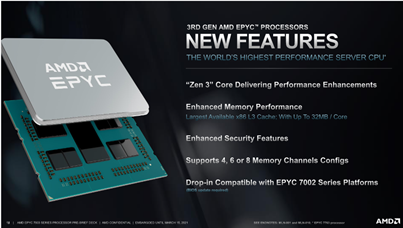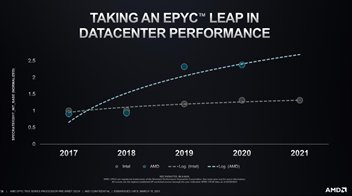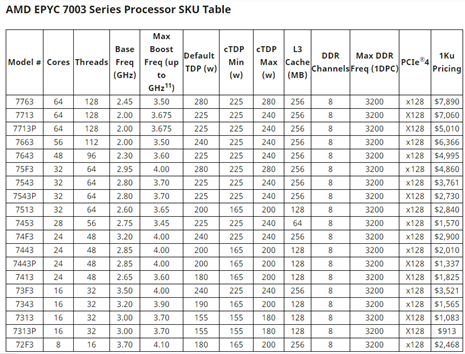 Striving to continue on its path back to HPC and data center processor market prominence, AMD this morning introduced a new series of EPYC “Milan” CPUs that industry analysts and customers say looks to be a price/performance juggernaut.
Striving to continue on its path back to HPC and data center processor market prominence, AMD this morning introduced a new series of EPYC “Milan” CPUs that industry analysts and customers say looks to be a price/performance juggernaut.
The EPYC 7003 series (SKUs below), designed by AMD and fabricated using Taiwan Semiconductor Manufacturing Co.’s 7-nanometer process, includes the highest performing server processor is built for HPC, cloud, hyperscaler and enterprise organizations, delivers up to 19 percent more instructions per clock, includes chips with up to 64 “Zen 3” cores per processor and offers new levels of per-core cache memory, while continuing to have PCIe 4 connectivity and the memory bandwidth of EPYC 7002 CPUs., according to AMD.
The new EPYCs also have security features through AMD Infinity Guard supporting what the company said is an expansion on existing Secure Encrypted Virtualization-Secure Nested Paging (SEV-SNP), adding memory protection by creating an isolated execution environment to block hypervisor-based attacks.
Analysts and AMD customers were in agreement that the new CPUs present a strong competitive challenge to HPC and data center server CPU market leader Intel.
“This is AMD continuing a second Opteron era,” said industry analyst Steve Conway, senior adviser, HPC Market Dynamics, at Hyperion Research, referring to the last period during which AMD held majority market share in the high performance CPU market sector. “It really is where they have a nice technical advantage that they are managing to continue. It’s pretty impressive. Their winning formula has been a combination of technical advantage, particularly memory bandwidth, combined with a pricing advantage for many SKUs… For most of the SKUs, the AMD pricing is lower than Intel. We’ve heard various buyers say it’s really hard not to consider AMD.”

Intel vs AMD – source: AMD
“With its advancements in Zen3, AMD is remaining steadfast to serving the high-performance segments it committed to when it first announced the Zen architecture,” said Addison Snell, co-founder and CEO of Intersect360 Research. “This regular drumbeat of steady improvements is appealing to those who care about advancing application performance. The HPC market has been responding. Our most recent survey found 70 percent of HPC users have at least some AMD EPYC CPUs installed, and 23 percent have them in broad deployment. AMD can build on this momentum with the EPYC 7003 Series. AMD’s penetration so far is highest in commercial HPC segments. HPC is HPC, whether in industry or the public sector, and many commercial organizations are looking to maximize their performance with AMD.”

source: AMD
“While the incremental performance of Milan is ‘only’ 19 percent faster than Rome, that is actually a pretty huge jump in these days of the end of Moore’s Law,” said Karl Freund, founder and principal analyst, Cambrian AI Research. “In fact, the Int8 operations are twice as fast as the previous generation. Integer math is critical for AI performance and is rapidly becoming mandatory for cloud service providers. Also, the new collaboration with Qualcomm and Gigabyte to create a 100 PetaOp rack for AI is pretty amazing, combining the new EPYC 7003 with the Qualcomm Cloud AI100 in Gigabyte servers.”

source: AMD
AMD said the EPYCs are available now and that it expects the EPYC ecosystem to grow by the end of 2021 with more than 400 cloud instances using EPYC chips and 100 server platforms using 3rdGen EPYCs. The 7003 series is offered through OEMs, ODMs, cloud providers and channel partners globally, including:
- AWS announced it will add EPYC 7003 chips to EC2 instance later this year.
- Cisco introduced Unified Computing System (Cisco UCS) rack server models with 7003 series processors designed for hybrid cloud workloads.
- Dell Technologies announced new PowerEdge XE8545 server with the 7003 series CPUs.
- Google Cloud said it will use 7003 series chips to power a new compute optimized C2D VM, and expand its general-purpose N2D VM later this year. Google Cloud Confidential Computing will be available on both C2D and N2D.
- HPE said it will double the number of its EPYC-powered solutions, including ProLiant and Apollo systems and HPE Cray EX supercomputers.
- Lenovo has added 10 ThinkSystem Servers and ThinkAgile HCI solutions built on 3rdGen EPYC processors, and said it has achieved more than 25 world records across a set of benchmarks.
- Microsoft Azure announced new virtual machine offerings powered by the 7003 series. Azure’s HPC-class HBv3 virtual machines are available today, and Confidential Computing virtual machines utilizing the security features of 7003 chips are in private preview.
- Oracle Cloud Infrastructure announced extension of its flexible virtual machine and bare metal compute offerings with a new E4 platform based on 3rdGeneration EPYCs.
- Supermicro introduced the 7003 series in its Supermicro A+ single and dual socket family of Ultra, Twin, SuperBlade, storageand GPU Optimized Systems.
- Tencent Cloud announced the Tencent Cloud SA3 server instance using the new EPYCs.
- VMware announced the VMware vSphere 7 that it said is optimized to leverage the new EPYCs for virtualization performance while supporting EPYC security capabilities for both virtual machine-based and containerized applications.
“These processors extend our data center leadership and help customers solve today’s most complex IT challenges, while substantially growing our ecosystem,” said Forrest Norrod, AMD’s SVP/GM, Data Center and Embedded Solutions Business Group. “We not only double the performance over the competition in HPC, cloud and enterprise workloads with our newest server CPUs, but together with the AMD Instinct GPUs, we are breaking the exascale barrier in supercomputing and helping to tackle problems that have previously been beyond humanity’s reach.”




